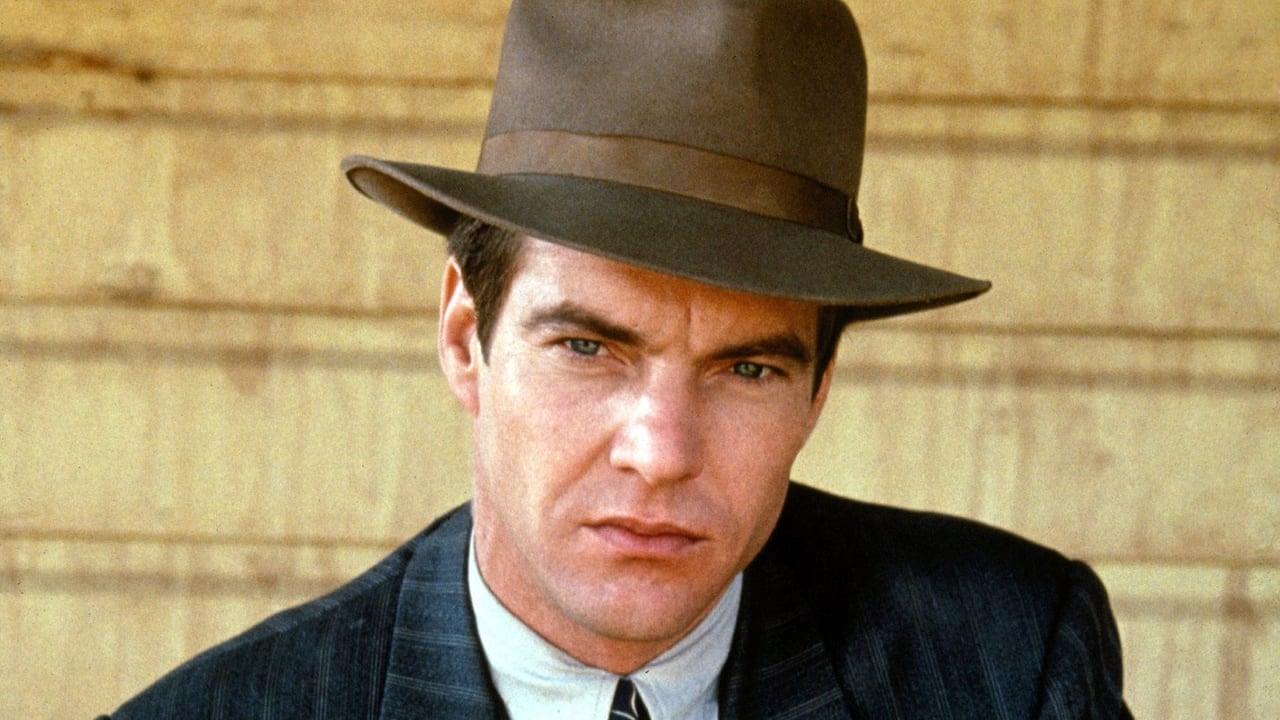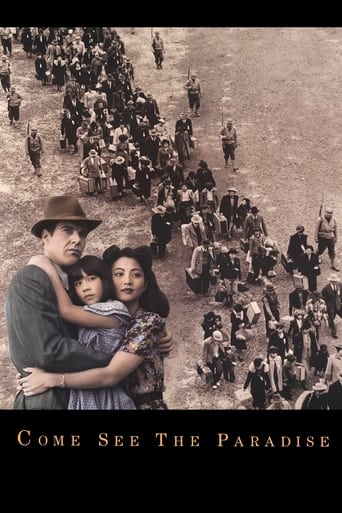Livestonth
I am only giving this movie a 1 for the great cast, though I can't imagine what any of them were thinking. This movie was horrible
Tobias Burrows
It's easily one of the freshest, sharpest and most enjoyable films of this year.
Bumpy Chip
It’s not bad or unwatchable but despite the amplitude of the spectacle, the end result is underwhelming.
Haven Kaycee
It is encouraging that the film ends so strongly.Otherwise, it wouldn't have been a particularly memorable film
erinaurielhendry
The film Come See the Paradise is a fairly standard Hollywood depiction of internment camps in the sense that it fails to focus on the many of the issues concerning internment and instead spends most of the film following an unbelievable and not convincing love story. The issue of Japanese internment is a charged subject and one of the darkest moments in American history. Thousands of American citizens and immigrants had their rights violated in dramatic ways because of racial prejudice. If one wants to portray this event in American history, the film must be tactful and treat the stories with care-Come See the Paradise failed to do this in almost every scene in the movie.
The majority of movie, which runs two hours and eighteen minutes long, follows the relationship of Lucy Kawamura, an American citizen of Japanese descent portrayed by Tamlyn Tomita, and Jack McGurn, an Irish American played by Dennis Quaid who once again proves he can only be called an actor on a technicality. Watching their relationship unfold on the screen is frustrating to say the least. The film fails to address the real animosity an interracial couple at that time would face and therefore misses an opportunity to make a powerful commentary on the American social norms. Also, the character of Jack McGurn does not need be in the film at all. His character just serves as a way to engage traditional American audiences and generally detracts from any points the film attempts to make.
There are several instances in the film which occur in the camp that are impactful. The discussion of the loyalty clauses the American government wanted the internees to sign and the dismal conditions within the camp were discussed and portrayed well. The film, however, choses to not focus on these events and instead continues to follow Jack McGurn and his struggles within the army. The film should have remained focused on the Kawamura family's experiences within the camp and attempt to portray the hardships and complex decisions which emerged during the course of the internment. Substance was sacrificed in this film in order to create a movie that would appeal to American audiences. Yet the film was still dismal by Hollywood standards as it had a cliché script, terrible acting, and overall muddle plot line which contained no resolution. I personally feel that if one is going to make a film about such as sensitive topic as Japanese Internment during World War II commercial goals should not be valued as much as concern for the memory of the victims and survivors.
ntaylor-28563
Come See the Paradise is a Hollywood dramatized historical film. It incorporates aspects of historical facts, but alters it greatly in order to make it more relatable to the average American. What does that mean in terms of the film? Well there must be a straight, white male lead because who can relate to Japanese Americans? This creates a noticeable flaw in the film as a whole. Dennis Quaid's character felt unnecessary, stereotypical, largely one-dimensional, and empowered by an overly noticeable sexual energy. Additionally, for a hefty film time of two hours and eighteen minutes, it felt as though only ~thirty of those minutes were spent inside the internment camp itself. It wasted so much time attempting to humanize these characters, and create backgrounds for them that it became confusing as to what type of movie we were watching. Although I appreciate the dedication for attempting to flesh out these characters more, most of this development could have been taken place within a camp setting. I did appreciate the depiction of portraying an interracial couple during a very racist time period. It was interesting to see how the Japanese family reacted to the situation, and seeing the expectation that Japanese women had in terms of their love life. It would be more important and realistic though to portray how society reacted to this couple. In 1940s California, people would not be accepting of a Japanese-American couple. This was a time where Japanese, or even other East Asian immigrants who appeared Japanese, were at times assaulted on the streets. The film touched on this with the racist Santa Claus, but this even had issues with it. Because of the film only depicted the racism through this one scene, it appears as though only a few Santas were racist, when in reality it would have been a majority of Santas! In reality, this couple would struggle to live their lives due to societal racism. They would be unable to eat at restaurants without complaint, see films, raise their daughter, etc. This was not depicted in the film. In fact, the film dedicated more time displaying how the Japanese family disapproved of the couple compared to society, that it made it seem that Japanese were more racist towards Americans, than Americans towards Japanese! This is an inaccurate depiction that severely hurt the films credibility.
Amelia Earhart
"Come See the Paradise" is nothing short of an insulting representation of what occurred in Japanese internment camps during World War II. While there are some redeeming qualities, it is masked by the incredibly awkward sexual interactions between Jack and Lily and the racial insensitivity. It is incredible that anyone who reviewed the film before letting it be shown in theaters would think that making a joke about Chinese people eating dogs was appropriate for the context of the film. One of the main questions I have about the film is why Dennis Quaid's character was necessary and if the director thought Jack was necessary, why did they not include the interrogation of Jack in the movie? This would have increased the quality of Jack's character tenfold. The red scare was a huge part of the time period and to reference it without developing the topic further was very confusing. There are only two semi redeeming plot lines that occur during the film that can somewhat accurately portray what it may have been like to be in a camp: Mr. Kawamura's rapid decline in the camp and Charlie's turn towards Japanese allegiance. Mr. Kawamura's rapid loss of self-respect and sense of self is an accurate portrayal of what happened to many people within camp systems because it showed how camps systematically could break people's psyche. Charlie joining the JCL, shaving his hair, and being sent to Tulley can be seen as a representation of the transformation of self within the camp. Charlie, having lost a sense of purpose within the camp system, found a new purpose by directing his allegiance to Japan. Many people have little knowledge about Japanese internment camps and this movie had the opportunity to introduce people to camps in a way that was representative of the camp system but failed to do so. The audience doesn't even see the camp until halfway through the film and the buildup to the camp is focused mostly on the relationship between Jack and Lily. Overall, I wouldn't recommend anyonesee if this movie unless the purpose was to point out why Hollywood is unable to do movie about camps well.
aphrodisiaciix
A very well acted and directed movie. Excellent details to the period with great cinematography. The story line is interesting with a very important subject matter. Most Americans nowadays have no idea that our government imprisoned these Japanese-Americans against their Constitutional rights. That alone is enough for the movie to be made and seen. We Americans tend to be forgetful of our past and neglect of history lessons from our own history. We have such track records of bias and discrimination against Asian immigrants such as the Chinese, the Japanese, the Vietnamese, the Cambodian, etc. Not to mention the two biggest stains on our social fabric: the African slaves and their descendants; and the Native Americans and their descendants. Remember, we build this nation from stolen land of the American-Indians and on the backs of the slaves. Along the way, we despised and badly treated every new group of immigrants come to this country with our discriminatory legislation and laws, overtly or covertly, with the government help or without. We need to know our history and learn from our mistakes to make a better nation... but then come Bush, Jr. ... and now... Donald Trump! We know we did not learn anything as a nation.

